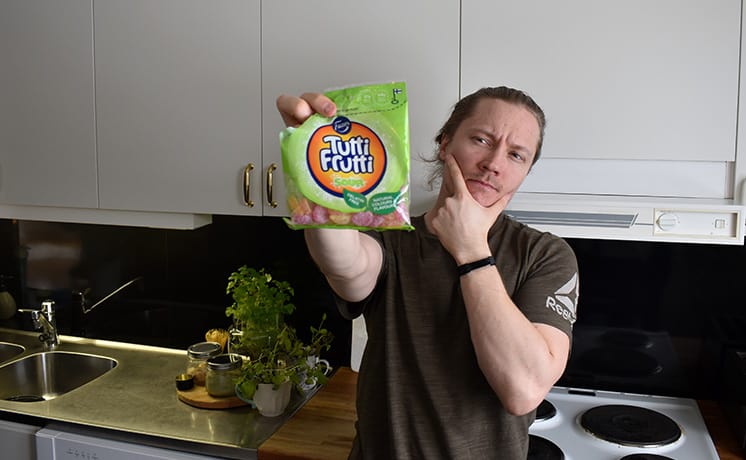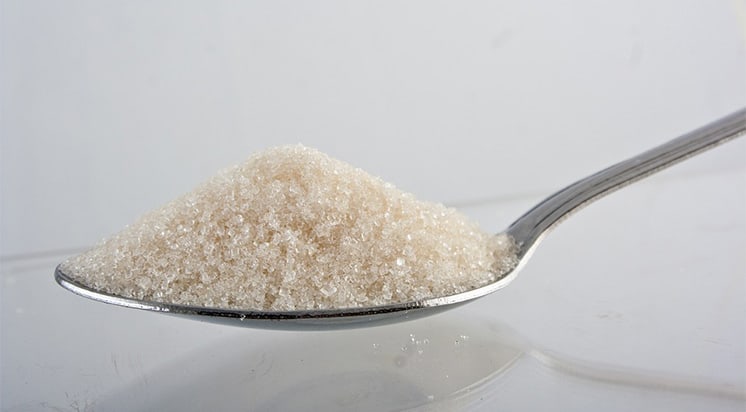
One question I get a lot is whether or not you can eat sugar while bulking. Often times people believe that refined sugar is bad for muscle growth, with the fear that the energy provided from the sugar goes straight to fat gain.
This is something that I’ve wondered myself, so I decided to find out if it’s bad to eat sugar while bulking or not.
Can you eat sugar while bulking? Yes you can eat sugar while bulking. Refined sugar can even be beneficial at the right times, in the right amounts and in the right context. The problem with sugar is that it’s highly addictive and non-satiating which often leads to overconsumption, causing fat gain and less muscle growth.
Sugar in and of itself isn’t the problem and won’t cause less muscle growth and more fat gain. The problem only appears when overconsuming sugar, especially at the wrong times and in the wrong context. In this post I’m going to cover what I mean with this, why sugar can be beneficial and when it’s not. I will also give you some guidelines when it comes to sugar consumption.
Table of Contents
Will Sugar Lead to Fat Gain?
A lot of people believe that eating sugar will automatically lead to fat gain, either because they’ve heard it to be true, or because they’ve actually experienced it themselves.
But the truth is that sugar won’t lead to fat gain, unless you’re in a calorie surplus.
Okay cool Niklas, but I’m bulking which means that I’m supposed to be in a calorie surplus, does this mean that I’ll gain fat from eating sugar?
Refined white sugar, which is what people refer to when they say sugar, is also known as Sucrose which is a disaccharide that is composed of two monosaccharides: glucose and fructose.
And do you know what else has glucose and fructose in it? Well, fruit, onions, bell-peppers and sweet potatoes all have both glucose and fructose in them, essentially containing what we call sugar. And these are all foods that we deem as healthy and that’s eaten a ton by people who have the goal to actually lose body fat.
Here’s where I’m going with this; if you would eat at a calorie surplus composed of the healthy foods listed above, you would actually gain fat. What I’m getting at here is that fat gain occurs in a calorie surplus, no matter where this surplus is coming from. In other words, sugar won’t lead to fat gain unless you’re eating more calories than your body burns.
Now, this isn’t the whole story though. We must also look at the main reason why people go on a bulk in the first place, and look at sugar intake from that perspective as well:
Will Sugar Reduce Muscle Growth?
The main reason people are bulking, or at least why they should be bulking, is to build lean muscle mass. Unless you’re extremely skinny why would you ever want to gain body fat, right?
Now, when it comes to the role of sugar for muscle growth it actually has the potential to either be incredibly beneficial or incredibly negative. Let me explain what I mean:
Sugar is beneficial at the right times, in the right amounts, and in the right context
This is where most people get confused when it comes to sugar. If you eat sugar at the right time, in the right amount, and in the right context it will benefit you. If however you do the opposite, it will harm you.
So, what is the the right time, right amount, and the right context? Well, these are actually interrelated with one another, but let me explain them one by one and then I try to tie them all together:
The right time to eat sugar
The best time to eat sugar when bulking is post workout. After a tough workout you’ve depleted some of your stored muscle and liver glycogen. This is the time when simple carbs such as glucose and fructose from sugar is highly beneficial as these sugars can restore your muscle and liver glycogen stores very quickly.
Combining sugar with protein post workout can quickly move your body into an anabolic state where it can start build muscle immediately and enable you to recover quicker.
Now, if you were to eat sugar, especially when not combined with other foods, before your training or a long time after it then it might be negative for muscle growth. The reason for this is that outside of the workout window the muscle building process is a rather slow process, which means that it consistent energy to work effectively.
To achieve the best muscle growth outside of your workout window you should provide your body with slow digesting complex carbohydrates, such as brown rice, whole wheat bread, whole wheat pasta and vegetables etc.
Having to many simple sugars at these times will only lead to quick rises in blood sugar levels, which is too quick for your muscle building process to make use of. Your body then must take care of this elevated blood sugar in another way, which is fat storage.
The right amount of sugar
Giving an exact number of how much sugar you should eat per day, or at any time, is very hard to do. This depends on so many factors such as body weight, your amount of muscle mass, training volume, training frequency, diet composition and so on.
With that said though, the US dietary guidelines advice people to limit their intake to less than 10% of their daily calorie intake. For a person eating 3200 calories per day when bulking to gain muscle, this would equal 80 grams of refined sugar per day. To give you some context this would be two 12 oz bottles of soda, or almost two bags of Skiddles (2.6 oz each).
Now, someone who’re training a lot, especially combined strength and cardio training, might get away with a higher sugar consumption, while someone who’re training very little might get away with less sugar.
Now, one
When these sugars should be eaten is as discussed earlier mostly under and after your training sessions. With that said though, sugars can be included outside of your workout window as well, if it’s in the right context:
The right context for sugar
This is where the right time and right amount of sugar can be skewed up or down a bit. When you combine simple sugars with protein, fat and especially with fibers you can reduce how quickly it’s absorbed by your body a lot!
Just think about this for a while; if you combine refined sugar with a large bowl of vegetables, beans, a protein source and some nuts, which are all foods that are very slowly digested, then suddenly you have a meal that’s not that different to let’s say a meal of whole wheat pasta carbonara.
Now, sugar contains 50% fructose and not only glucose, and it’s been shown that a too high intake of fructose is what’s most negative with sugar, and this is why you should still stay within the 10% of total calories from refined sugar recommendation.
The Problem With Sugar is That it’s Addictive

Lastly, we must also cover the biggest problem with sugar, which is that it’s highly addictive for most people.
Researcher have seen that sugar promotes just as high levels of the feel-good neurotransmitter dopamine in the brain as cocaine does. By eating sugar the brain can become more or less “hijacked” by the intense dopamine signal, causing us to crave more and more sugar.
Now of course, some people get higher dopamine kicks than others, while others can also handle higher dopamine better, so some people simply can’t get addicted to sugar in the same way as most of us do.
With that said though, on average most of us get addicted easily to sugar, so doing our best to avoid sugar is very smart if we want to build muscle, while staying lean and also healthy. Especially if we can’t get rid of the sweat-tooth once it has kicked it.
So, even though it’s okay to eat sugar during the right time, in the right amount, and in the right context, this might not be doable since we’re likely to continue eating once we’ve started to eat. For example, you might have a bit of sugar after your training, which then leads to you wanting more later in the day/evening, or even the next day, during a time when it’s less than optimal to have sugar.
Related Questions
Can you eat junk food when bulking? Junk food is defined as everything that’s not a wholesome, nutrient dense meal. This includes pizza, burgers, sandwiches and so on. These kind of meals are also very addictive and are very poor in nutrients.
The problem that can appear when you eat too much junk foods is that you’re missing out on important micronutrients. Furthermore, eating to much satiated fats and sugars, which are often included in these foods, are also negative to your health, especially in combination with a calorie surplus.
For junk foods in general a good rule of thumb is to allow 20% of your total calorie intake to come from junk foods, the remaining 80% should come from nutrient dense, wholesome foods.

This was a great article for beginners! My question to you is how much more do I need to eat? I work in a very fast paced auto garage where I work 12 hour shifts and 15 cars every day and then try to workout either before or after my shift. I am 6′ 4″ and 210. Always been skinny but I’ve hit a wall now. I aim for 4k in calories and 1.5g of protien and 1.8g or carbs per pound of body weight. Is this not enough?
Thank you! Oh wow, that’s a high daily activity you have there hehe. So you’re saying that you want to gain more weight but have plateaued, right? If so you must eat even more than 4k calories per day if that intake no longer increases your weight. Caloric intake is all that matters when it comes to weight gain. So it’s either push more food in or find a way to move less. Hope this helps.